
All-powerful God,

- The Nature of an All-Powerful God: Understanding Omnipotence
- Exploring the Characteristics of an All-Powerful Deity
- The Role of Faith in Believing in an All-Powerful God
- How Different Religions Perceive an All-Powerful God
- The Implications of Omnipotence in Theological Debates
- Finding Comfort in the Presence of an All-Powerful God
The concept of divinity has long captivated humanity, offering answers to profound questions about existence, morality, and the universe itself. Central to many theological discussions is the idea of an **All-powerful God**, a being whose omnipotence transcends all limitations and challenges our understanding of reality.
In exploring the attributes of an **All-powerful God**, we delve into the implications of such power on free will, the nature of evil, and the existence of suffering. This exploration invites both believers and skeptics to reflect on the complexities of faith and the divine influence on human affairs.
The Nature of an All-Powerful God: Understanding Omnipotence
The nature of an All-powerful God is often examined through the lens of philosophical inquiry and theological debate. Omnipotence refers to the ability to do anything that is logically possible, yet this definition raises questions about the coherence of certain actions. For instance, can an all-powerful being create a rock so heavy that even they cannot lift it? Such paradoxes challenge our understanding of power and its limits.
Moreover, the implications of an All-powerful God extend to various aspects of existence, particularly concerning human freedom. The tension between divine omnipotence and human free will is a central theme in many religious traditions. This relationship can be summarized as follows:
- Divine Sovereignty: The belief that God governs all aspects of the universe.
- Human Agency: The capacity of individuals to make independent choices.
- Intervention vs. Autonomy: The debate about whether divine action overrides human decision-making.
In addition, the presence of suffering and evil in the world poses significant questions regarding the nature of an All-powerful God. Many argue that if God is all-powerful and all-good, then the existence of evil is paradoxical. This situation has led to various theological responses, including:
- The Free Will Defense: Suggests that God allows evil for the sake of preserving human freedom.
- The Greater Good Argument: Proposes that some evils are necessary for a greater purpose.
Ultimately, understanding the nature of an All-powerful God invites individuals to navigate complex philosophical questions and deepen their exploration of faith. By grappling with these concepts, one may find a more nuanced appreciation for the divine and its role in the cosmos.
Exploring the Characteristics of an All-Powerful Deity
When exploring the characteristics of an All-powerful God, one must consider the implications of omniscience, which accompanies omnipotence. Omniscience refers to the state of knowing everything that can possibly be known. This attribute raises intriguing questions about the relationship between divine knowledge and human experience, especially in terms of foreknowledge and destiny. Does an all-knowing deity dictate our paths, or does it allow for genuine human spontaneity?
Additionally, the concept of an All-powerful God often encompasses attributes such as omnipresence and omnibenevolence. These characteristics shape our understanding of how the divine interacts with the world. For instance, the belief in omnipresence suggests that God is present everywhere, which can lead to the perception that divine intervention is constantly at play in human affairs. This can be summarized as follows:
- Omnipresence: The belief that God exists in all places at all times.
- Omnibenevolence: The idea that God is all-good and acts with unconditional love.
Furthermore, the exploration of an All-powerful God invites discussions about the nature of morality and ethics. If God is the ultimate source of goodness, then moral truths are grounded in divine will. This leads to questions regarding the nature of morality independent of God. Can humans possess genuine moral values without divine guidance, or are all ethical frameworks contingent upon a higher power?
Ultimately, examining the characteristics of an All-powerful God encourages deep reflection on faith, existence, and the moral fabric of life. By contemplating these divine attributes, individuals can foster a richer understanding of their beliefs and the complexities inherent in the divine-human relationship.
The Role of Faith in Believing in an All-Powerful God
The role of faith in believing in an All-powerful God is foundational for many adherents of various religious traditions. Faith acts as a bridge that connects believers to the divine, fostering trust in God's omnipotence and benevolence. This connection can manifest in different ways, such as:
- Personal Experience: Individuals often recount personal encounters that deepen their faith.
- Community Support: Shared beliefs within religious communities provide a sense of belonging and encouragement.
- Rituals and Practices: Engaging in worship practices reinforces faith and collective understanding of God’s power.
Moreover, faith plays a critical role in how believers respond to challenges and uncertainties. Trust in an All-powerful God can provide solace in difficult times, reinforcing the belief that there is a greater purpose behind suffering. This perspective often encourages individuals to adopt a resilient attitude, characterized by:
- Hope: Expectation of good outcomes despite current hardships.
- Prayer: Seeking divine intervention through personal or communal supplication.
- Reflection: Contemplating life's challenges as opportunities for spiritual growth.
Furthermore, a profound faith in an All-powerful God can lead to transformative life choices. Believers often find motivation to pursue ethical living and altruism, driven by the desire to align their actions with divine will. This sense of purpose can be summarized in three key aspects:
- Service to Others: Engaging in acts of kindness and charity.
- Moral Integrity: Upholding values that reflect divine teachings.
- Spiritual Growth: Continuously seeking to deepen one's relationship with God.
In conclusion, faith serves as an essential component in the belief in an All-powerful God, influencing how individuals perceive their lives, address suffering, and interact with the world around them. This multifaceted role of faith nurtures a dynamic relationship with the divine, encouraging believers to embrace hope, morality, and purpose in their daily lives.
How Different Religions Perceive an All-Powerful God
Different religions offer unique perspectives on the nature of an All-powerful God, often reflecting their historical and cultural contexts. In monotheistic faiths like Christianity, Islam, and Judaism, God is viewed as a singular, sovereign entity whose power governs every aspect of existence. These traditions emphasize God's omnipotence as a source of ultimate authority and moral guidance, presenting a deity deeply involved in the affairs of humanity.
Conversely, in Hinduism, the understanding of divinity is more complex, encompassing multiple forms and manifestations of God. The concept of Brahman represents the ultimate reality, an all-encompassing force that is both immanent and transcendent. This perspective allows for a diverse range of deities, each embodying different aspects of the divine, which can lead to a rich tapestry of worship and understanding of an All-powerful God.
Similarly, in Buddhism, the notion of an all-powerful creator God is largely absent. Instead, the focus is on enlightenment and the attainment of Nirvana through personal effort and understanding. While some Buddhist traditions may recognize divine beings or bodhisattvas, the emphasis is primarily on individual agency and the path to liberation, highlighting a different interpretation of power and divinity.
Ultimately, the perception of an All-powerful God varies widely across religious landscapes, shaped by distinct theological frameworks and cultural narratives. This diversity prompts profound questions about the nature of divine power, human agency, and the moral implications of faith, inviting followers to engage in a deeper exploration of their beliefs.
The Implications of Omnipotence in Theological Debates
The implications of an All-powerful God in theological debates often extend to the discourse on morality and ethics. If such a deity is the source of all moral truths, it prompts questions about the nature of goodness independent of divine authority. Are moral values inherently tied to God's will, or can they exist apart from a higher power? This inquiry leads to various positions within philosophical ethics, including:
- Divine Command Theory: Asserts that moral principles are dictated by God's commands.
- Secular Morality: Proposes that ethical values can be derived from human experience without divine input.
Moreover, the presence of an All-powerful God raises significant concerns about the problem of evil and suffering. The existence of horrendous acts and natural disasters challenges the coherence of divine omnipotence and benevolence. This dilemma can inspire a deeper exploration of belief systems, leading to diverse theological responses such as:
- Theodicy: Attempts to justify God’s goodness in light of human suffering.
- Process Theology: Suggests that God's power is not coercive but persuasive, allowing for human freedom and the unfolding of the universe.
In addition, the concept of omnipotence fuels discussions about prayer and divine intervention. If God is truly all-powerful, the efficacy of prayer becomes a focal point of debate. Believers grapple with whether prayer changes outcomes or serves as a means of aligning human will with divine purpose. This relationship can be encapsulated in three key aspects:
- Intercessory Prayer: Requests for divine help on behalf of others.
- Personal Prayer: Seeking guidance and strength in individual circumstances.
- Collective Worship: Community prayer as an expression of shared faith and reliance on divine power.
Ultimately, the implications of an All-powerful God in theological debates foster rich discussions that challenge our understanding of reality, morality, and human existence. By grappling with these complex ideas, individuals are invited to explore their beliefs and the profound mysteries surrounding divinity and its role in the world.
Finding Comfort in the Presence of an All-Powerful God
Finding comfort in the presence of an All-powerful God can serve as a profound source of solace for many individuals facing life's uncertainties. This divine assurance can manifest in various forms, helping believers navigate challenges with a sense of peace and purpose. The ability to trust in an omnipotent being allows people to relinquish control and embrace the comfort of faith, leading to a more resilient mindset.
Believers often experience emotional relief through a deeper connection with their All-powerful God. This relationship can provide a framework for understanding life's trials, including:
- Emotional Support: The belief that God is present in moments of distress offers reassurance.
- Guidance: Seeking divine wisdom can clarify complex decisions and alleviate feelings of isolation.
- Hope: Trusting in God's plan fosters optimism, encouraging individuals to endure hardships with faith.
Additionally, the practice of prayer plays a significant role in finding comfort. Engaging in regular prayer can strengthen one's relationship with an All-powerful God, facilitating a deeper sense of connection and peace. Through prayer, individuals often experience:
- Reflection: Contemplating personal struggles can lead to insights and resolutions.
- Community Spirit: Participating in group prayers creates a sense of belonging and collective support.
- Renewed Strength: Many find empowerment in expressing their fears and hopes, reinforcing their faith in divine assistance.
Ultimately, the assurance of an All-powerful God nurtures a sense of security in believers, allowing them to face life's uncertainties with courage. This comforting presence serves as a reminder of the divine's unwavering support, providing both emotional and spiritual strength during challenging times.
En este sentido, te invitamos a ver el siguiente video titulado "All-powerful God," donde exploraremos en profundidad las características y significados de la divinidad en diferentes contextos.
Si quieres conocer otras oraciones milagrosas parecidas a All-powerful God, puedes visitar la categoría Virgen María.
Deja una respuesta
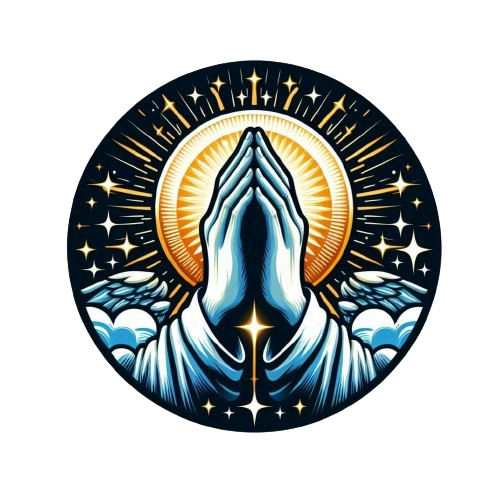
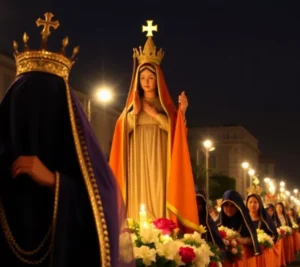
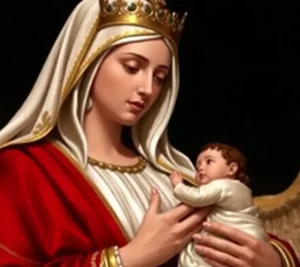

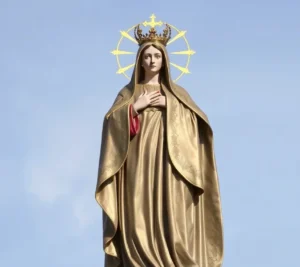
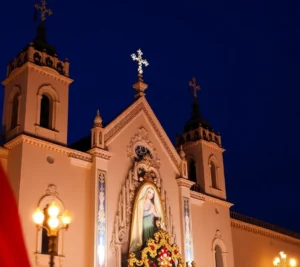
¡Más Oraciones Milagrosas!